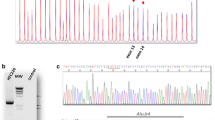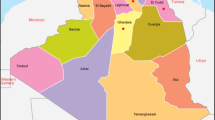Abstract
Introduction
Previous studies have investigated the possibility that specific mutations may be related to specific clinicopathological features. However, most previous investigations included only an average age (40–80 years) group of sporadic colorectal cancers and, moreover, studied only a single gene in isolation. Therefore, the influence of age on these mutation frequencies remains unclear, despite age being considered a risk factor for genetic mutation.
Materials and methods
This study included 122 sporadic colorectal cancers from three different age groups and analyzed mutation frequencies of adenomatous polyposis coli (APC), K-ras, and p53 genes and microsatellite instability to determine their mutation frequencies and relationships with clinicopathological features.
Results
Significantly lower p53 mutation frequencies were observed among young (32 years old or younger) and old (86 years old or older) patient groups compared with an average age (39–85 years old) patient group (14.3% and 19.2% versus 51.5%, P<0.001). APC mutation frequency (11.8%) was significantly lower in highly aggressive (Dukes’ stage D) tumors (P=0.003) than in the other stage tumors (Dukes’ stage A, B, and C). Additionally, simultaneous occurrence of all three genetic alterations in an individual tumor was rare (below 5%). Statistical analysis further confirmed that mutation number in Dukes’ D tumors occurred less frequently than expected in other stage tumors (P=0.008).
Conclusions
Genetic alterations of sporadic colorectal cancers have different relationships with age or tumor stage. Additionally, most sporadic colorectal tumors do not necessarily require following the widely accepted genetic model, because the three key genetic mutations, APC, K-ras, and p53, rarely occur simultaneously.

Similar content being viewed by others
References
Al-Mulla F, Going JJ, Sowden ET, Winter A, Pickford IR, Birnie GD (1998) Heterogeneity of mutant versus wild-type Ki-ras in primary and metastatic colorectal carcinomas, and association of codon-12 valine with early mortality. J Pathol 185:130–138
Astler VB, Coller FA (1954) The prognostic significance of direct extension of carcinoma of the colon and rectum. Ann Surg 139:846–848
Baisse B, Bouzourene H, Saraga E, Bosman FT, Benhattar J (2001) Intratumor genetic heterogeneity in advanced human colorectal adenocarcinoma. Int J Cancer 93:346–352
Balducci L, Beghe C (2001) Cancer and age in the USA. Crit Rev Oncol Hematol 37:137–145
Bazan V, Migliavacca M, Zanna I, Tubiolo C, Grassi N, Latteri MA, La Farina M, Albanese I, Dardanoni G, Salerno S, Tomasino RM, Labianca R, Gebbia N, Russo A (2002) Specific codon 13 K-ras mutations are predictive of clinical outcome in colorectal cancer patients, whereas codon 12 K-ras mutations are associated with mucinous histotype. Ann Oncol 13:1438–1446
Boland CR, Thibodeau SN, Hamilton SR, Sidransky D, Eshleman JR, Burt RW, Meltzer SJ, Rodriguez-Bigas MA, Fodde R, Ranzani GN, Srivastava SA (1998) National Cancer Institute Workshop on Microsatellite Instability for cancer detection and familial predisposition: development of international criteria for the determination of microsatellite instability in colorectal cancer. Cancer Res 58:5248–5257
Breivik J, Meling GI, Spurkland A, Rognum TO, Gaudernack G (1994) K-ras mutation in colorectal cancer: relations to patient age, sex and tumour location. Br J Cancer 69:367–371
Chiang JM, Chou-Wu YH, Wang JY (2000) Synchronous colorectal carcinoma and adenoma may arise from independent neoplastic colonal expansion. JS CRS ROC 11:1–7
Chiang JM, Chou YH, Chen TC, Ng KF, Lin JL (2002) Nuclear beta-catenin expression is closely related to ulcerative growth of colorectal carcinoma. Br J Cancer 86:1124–1129
Chiang JM, Chen MC, Changchien CR, Chen JS, Tang R, Wang JY, Yeh CY, Fan CW, Tsai WS (2003) Favorable influence of age on clinicopathological features of sporadic colorectal cancer. Dis Colon Rectum 46:904–910
Cottu PH, Muzeau F, Estreicher A, Flejou JF, Iggo R, Thomas G, Hamelin R (1996) Inverse correlation between RER+ status and p53 mutation in colorectal cancer cell lines. Oncogene 13:2727–2730
De Filippo C, Luceri C, Caderni G, Pacini M, Messerini L, Biggeri A, Mini E, Tonelli F, Cianchi F, Dolara P (2002) Mutations of the APC gene in human sporadic colorectal cancer Scand J Gastroenterol 9:1048–1053
Fearon ER, Vogelstein B (1990) A genetic model for colorectal tumorigenesis. Cell 61:759–767
Freedman AN, Michalek AM, Marshall JR, Mettlin CJ, Petrelli NJ, Black JD, Zhang ZF, Satchidanand S, Asirwatham JE (1996) Familial and nutritional risk factors for p53 overexpression in colorectal cancer. Cancer Epidemiol Biomarkers Prev 5:285–291
Goh HS, Chan CS, Khine K, Smith DR (1994) P53 and behavior of colorectal cancer. Lancet 344:233–234
Hermsen M, Postma C, Baak J, Weiss M, Rapallo A, Sciutto A, Roemen G, Arends JW, Williams R, Giaretti W, De Goeij A, Meijer G (2002) Colorectal adenoma to carcinoma progression follows multiple pathways of chromosomal instability. Gastroenterology 123:1109–1119
Jervoise H, Andreyev N, Norman AR, Cunningham D, Oates JR, Clarke PA (1998) Kirsten ras mutations in patients with colorectal cancer: the multicenter ‘RASCAL’ study. J Natl Cancer Inst 90:675–684
Kastrinakis WV, Ramchurren N, Rieger KM, Hess DT, Loda M, Steele G, Summerhayes IC (1995) Increased incidence of p53 mutations is associated with hepatic of metastasis in colorectal neoplastic progression. Oncogene 11:647–652
Laurent-Puig P, Olschwang S, Delattre O, Validire P, Melot T, Mosseri V, Salmon RJ, Thomas G (1991) Association of Ki-ras mutation with differentiation and tumor-formation pathways in colorectal carcinoma. Int J Cancer 49:220–223
Leslie A, Pratt NR, Gillespie K, Sales M, Kernohan NM, Smith G, Wolf R, Carey FA, Steele RJC (2003)Mutations of APC, K-ras, and p53 are associated with specific chromosomal aberrations in colorectal adenocarcinomas. Cancer Res 63:4656–4661
Levi S, Urbano-Ispizua A, Gill R, Thomas DM, Gilbertson J, Foster C, Marshall CJ (1991) Multiple K-ras codon 12 mutations in cholangiocarcinomas demonstrated with a sensitive polymerase chain reaction technique. Cancer Res 51:3497–3502
Liang JT, Cheng YM, Chang KJ, Chien CT, Hsu HC (1999) Reappraisal of K-ras and p53 gene mutations in the recurrence of Dukes’B2 rectal cancer after curative resection. Hepatogastrointerology 46:830–837
Liang JT, Huang KC, Cheng AL, Jeng YM, Wu MS, Wang SM (2003) Clinicopathological and molecular biological features of colorectal cancer in patients less than 40 years of age. Br J Surg 90:205–214
Lichtenstein P, Holm NV, Verkasalo PK, Iliadou A, Kaprio J, Koskenvuo M, Pukkala E, Skytthe A, Hemminki K (2000) Environmental and heritable factors in the causation of cancer—analyses of cohorts of twins from Sweden, Denmark, and Finland. N Engl J Med 343:78–85
Liu B, Farrington SM, Petersen GM, Hamilton SR, Parsons R, Papadopoulos N, Fujiwara T, Jen J, Kinzler KW, Wyllie AH (1995) Genetic instability occurs in the majority of young patients with colorectal cancer. Nat Med 1:348–352
Makino H, Ushijima T, Kakiuchi H, Onda M, Ito N, Sugimura T, Nagao M (1994) Absence of p53 mutations in rat colon tumors induced by 2-amino-6- methyldipyrido [1, 2-a:3’, 2’-d] imidazole, 2-amino-3-methylimidazo [4, 5-f] quinoline, or 2-amino-1-methyl-6-phenylimidazo [4, 5-b] pyridine. Jpn J Cancer Res 85:510–514
Miyki M, Iijima T, Yasuno M, Kita Y, Hishima T, Kuroki T, Mori T (2002) High incidence of protein-truncating mutations of the p53 gene in liver metastases of colorectal carcinoma. Oncogene 21:6689–6693
Nakamura Y (1993) The role of the adenomatous polyposis coli (APC) gene in human cancer. Adv Cancer Res 62:65–87
Obrador A, Moreno V, Bautista D, Cabeza E, Canet R (1998) Colorectal cancer, diet, and p53 Gastroenterology, 114[Suppl 4]:G2705, part 2
Pauly M, Schmitz M, Kayser I, Tureci O, Tureci O, Lagoda P, Seitz G, Dicato M (1997) Ki-ras oncogene and p53 tumor suppressor gene mutations in colorectal carcinomas from the European Saar-Luxembourg region are less frequent than predicted by the classic adenoma-carcinoma sequence model. Eur J Cancer 33:2265–2272
Pollack IF, Finkelstein SD, Burnham J, Holmes EJ, Hamilton RL, Yates AJ, Finlay JL, Sposto R (2001) Children’s Cancer Group. Age and TP53 mutation frequency in childhood malignant gliomas: results in a multi-institutional cohort. Cancer Res 61:7404–7407
Prosser J, Condie A, Wright M, Horn JM, Fantes JA, Wyllie AH, Dunlop MG (1994) APC mutation analysis by chemical cleavage of mismatch and a protein truncation assay in familial adenomatous polyposis. Br J Cancer 70:841–846
Samowitz WS, Holden JA, Curtin K, Edwards SL, Walker AR, Lin HA, Robertson MA, Nichols MF, Gruenthal KM, Lynch BJ, Leppert MF, Slattery ML (2001) Inverse relationship between microsatellite instability and K-ras and p53 gene alterations in colon cancer. Am J Pathol 158:1517–1524
Samowitz WS, Curtin K, Ma KN, Edwards S, Schaffer D, Leppert MF, Slattery ML (2002) Prognostic significance of p53 mutations in colon cancer at the population level. Int J Cancer 99:597–602
Sedivy R, Wolf B, Kalipciyan M, Steger GG, Karver-Hanusch J, Moder RM (2000) Genetic analysis of multiple synchronous lesions of the colon adenoma-carcinoma sequence, Br J Cancer 82:1276–1282
Shen L, Kondo Y, Hamilton SR, Rashid A, Issa JP (2003) P14 methylation in human colon cancer is associated with microsatellite instability and wild-type p53. Gastroenterology 124:626–633
Smith G, Carey FA, Beattie J, Wilkie MJ, Lightfoot TJ, Coxhead J, Garner RC, Steele RJ, Wolf CR (2002) Mutations in APC, Kirsten-ras, and p53—alternative genetic pathways to colorectal cancer. PNAS 99:9433–9438
Suh JH, Lim SD, Kim JC, Hong SH, Kang GH (2002) Comparison of clinicopathologic characteristics and genetic alterations between microsatellite instability-positive and microsatellite instability-negative sporadic colorectal carcinomas in patients younger than 40 years old. Dis Colon Rectum 45:219–228
van der Luijt R, Khan PM, Vasen H, van Leeuwen C, Tops C, Roest P, den Dunnen J, Fodde R (1994) Rapid detection of translation-terminating mutations at the adenomatous polyposis coli (APC) gene by direct protein truncation test. Genomics 20:1–4
Vogelstein B, Fearon ER, Hamilton SR, Kern SE, Preisinger AC, Leppert M, Nakamura Y, White R, Smits AM, Bos JL (1988) Genetic alterations during colorectal-tumor development. N Engl J Med 319:525–532
Zauber NP, Sabbath-Solitare M, Marotta SP, Zauber AG, Bishop DT (2001) Molecular changes in the Ki-ras and APC genes in colorectal adenomas and carcinomas arising in the same patient. J Pathol 93:303–309
Acknowledgement
Supported by the National Science Council of the Republic of China, Taiwan (NSC89-2314-B-182A-171).
Author information
Authors and Affiliations
Corresponding author
Rights and permissions
About this article
Cite this article
Chiang, JM., Wu Chou, YH., Ma, SC. et al. Influence of age on adenomatous polyposis coli and p53 mutation frequency in sporadic colorectal cancer—rarity of co-occurrence of mutations in APC, K-ras, and p53 genes. Virchows Arch 445, 465–471 (2004). https://doi.org/10.1007/s00428-004-1116-z
Received:
Accepted:
Published:
Issue Date:
DOI: https://doi.org/10.1007/s00428-004-1116-z




